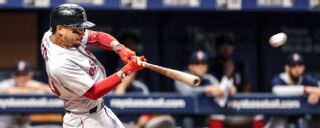|
This story appears in the Sept. 10 issue of ESPN The Magazine. Subscribe today! Last November Mookie Betts rolled a 300 game in the PBA World Series of Bowling. This spring he solved a Rubik's Cube, on television, in under two minutes. Primarily a second baseman in the minors, Betts converted to the outfield upon reaching the Boston Red Sox four years ago and has now saved more runs for his team since 2016 (76, through Aug. 19) than any other major league fielder. These facts are cool. More important, they testify to Betts' most admirable trait: his willingness to work hard at endlessly repetitive tasks, picking up patterns and fine-tuning again and again to improve the expression of his impressive natural skills. Now Betts has turned his focus to re-engineering his approach at the plate. His latest round of adjustments is keying the Red Sox's remarkable offensive surge -- and forcing us to reconsider what analytics means for hitting. Boston has been saturated with statheads for years, but sabermetric insights about plate discipline didn't do the organization much good in 2017. The Red Sox ranked fourth in the American League in walks but scored just 4.85 runs per game, sixth best in the AL, largely because their 168 home runs ranked dead last in the league. Owner John Henry traced the club's power drop to its passivity: Boston batters swung at just 62.3 percent of pitches in the strike zone last season, the lowest percentage of any MLB team, according to FanGraphs. Henry brought in a new manager, Alex Cora, and hitting coach, Tim Hyers, who promised to get the team on the attack. Swinging more for its own sake isn't worth anything -- but neither is letting hittable pitches go by. The Red Sox understood that batters can reach a point where standing around to get on base can mean forgoing chances to drive the ball. So they decided, as Cora put it, "to have guys ready to do damage early in the count." That's not easy -- ideally, you have to swing hard but only at pitches you can smack. You need disciplined aggression. But that's what Betts has, and players up and down the Red Sox lineup are showing it now too. The Red Sox swung at the first pitch in only 20.9 percent of their 2017 plate appearances, versus a league average of 28.1 percent, according to Baseball Reference. This season that number is up to 27.3 percent. And in plate appearances that conclude after one pitch, Xander Bogaerts' OPS has increased by 137 points, Betts' by 262 points and Mitch Moreland's by 360 points! Last winter Boston signed J.D. Martinez, who, it just so happens, has a preternatural ability to crush the first ball he sees. Over his career, even including the years before he raised his launch angle, Martinez has hit .431 and slugged .815 in at-bats ending in the first pitch. This season his OPS in that situation is 1.639. Those numbers are not typos. The Red Sox knew what they were doing when they brought Martinez to town. Overall, Boston hitters have swung at 68.4 percent of strikes this year, jumping to 11th highest in baseball, while swinging at hardly any more bad pitches and while maintaining a high contact rate (79.6 percent, second in MLB). Those are indeed the statistical tracks of disciplined aggression. And these Red Sox lead the league in hits (by a wide margin) and in runs scored. In this era of endlessly rising strikeouts, Betts in particular has figured out how to fight back. He doesn't swing at many pitches but makes powerful contact when he does. Now he's advancing that combo to earlier in the count. Just 23 percent of his plate appearances this season have ended with him behind in the count, down from 31.4 percent before 2018. Betts doesn't let pitchers get to strike three because he doesn't let them get to strike two. Looking ahead, I think this approach could lead teams to rethink the entire philosophy of getting opponents' pitch counts up, especially given the rise of super-bullpens. Why try to work Lance Lynn for walks only to see him replaced by Dellin Betances, Zach Britton and Aroldis Chapman? I also think Boston's aggression is the kind that will serve the team well in the fall. This is speculative, but from what I can tell, it's better to rely on your own power than opponent mistakes in the postseason -- there's not much chance to take extra bases or beat up No. 5 starters because there are no bad teams in the playoffs. Put it this way: With Betts hitting leadoff, I wouldn't want to miss the first pitch.
|


